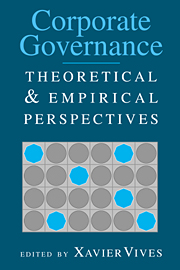Book contents
- Frontmatter
- Contents
- Preface
- Contributors
- 1 Corporate Governance: Does It Matter?
- 2 Corporate Governance and Competition
- 3 On the Economics and Politics of Corporate Finance and Corporate Control
- 4 How Do Financial Systems Affect Economic Performance?
- 5 Information and Governance in the Silicon Valley Model
- 6 The Governance of the New Enterprise
- Index
3 - On the Economics and Politics of Corporate Finance and Corporate Control
Published online by Cambridge University Press: 05 June 2012
- Frontmatter
- Contents
- Preface
- Contributors
- 1 Corporate Governance: Does It Matter?
- 2 Corporate Governance and Competition
- 3 On the Economics and Politics of Corporate Finance and Corporate Control
- 4 How Do Financial Systems Affect Economic Performance?
- 5 Information and Governance in the Silicon Valley Model
- 6 The Governance of the New Enterprise
- Index
Summary
Introduction
The purpose of this essay is to call for a reassessment of the significance of corporate finance for corporate control and for a reorientation of the theory of corporate governance. The long-running repertory play “Banks versus Markets” should be taken off the playbill for a while, to be replaced perhaps by a new offering “Career Patterns, Intrigues, and Resource Allocation in Insider Systems with Mutual Interdependence.”
According to the recent authoritative survey by Shleifer and Vishny (1997), “corporate governance deals with the ways in which suppliers of finance to corporations assure themselves of getting a return on their investment.” Through suitable governance mechanisms, “advanced countries … have assured the flow of enormous amounts of capital to firms, and actual repatriation of profits to the providers of finance.” This view rests on the notions that (i) the corporate sector needs external funds for investment, (ii) the financial system channels such funds to the corporate sector from the household sector, and (iii) in this system the interests of external providers of funds are safeguarded through control rights giving them scope for interfering with management misbehavior.
With this view of corporate governance, the literature has studied the incentive implications of different governance mechanisms for company management and financiers. Attention has focused in particular on the free-rider problem that arises if a company has many outside financiers and the resources that any one of them devotes to monitoring and controlling the company's management provides benefits to all of them jointly.
- Type
- Chapter
- Information
- Corporate GovernanceTheoretical and Empirical Perspectives, pp. 95 - 136Publisher: Cambridge University PressPrint publication year: 2000
- 93
- Cited by



